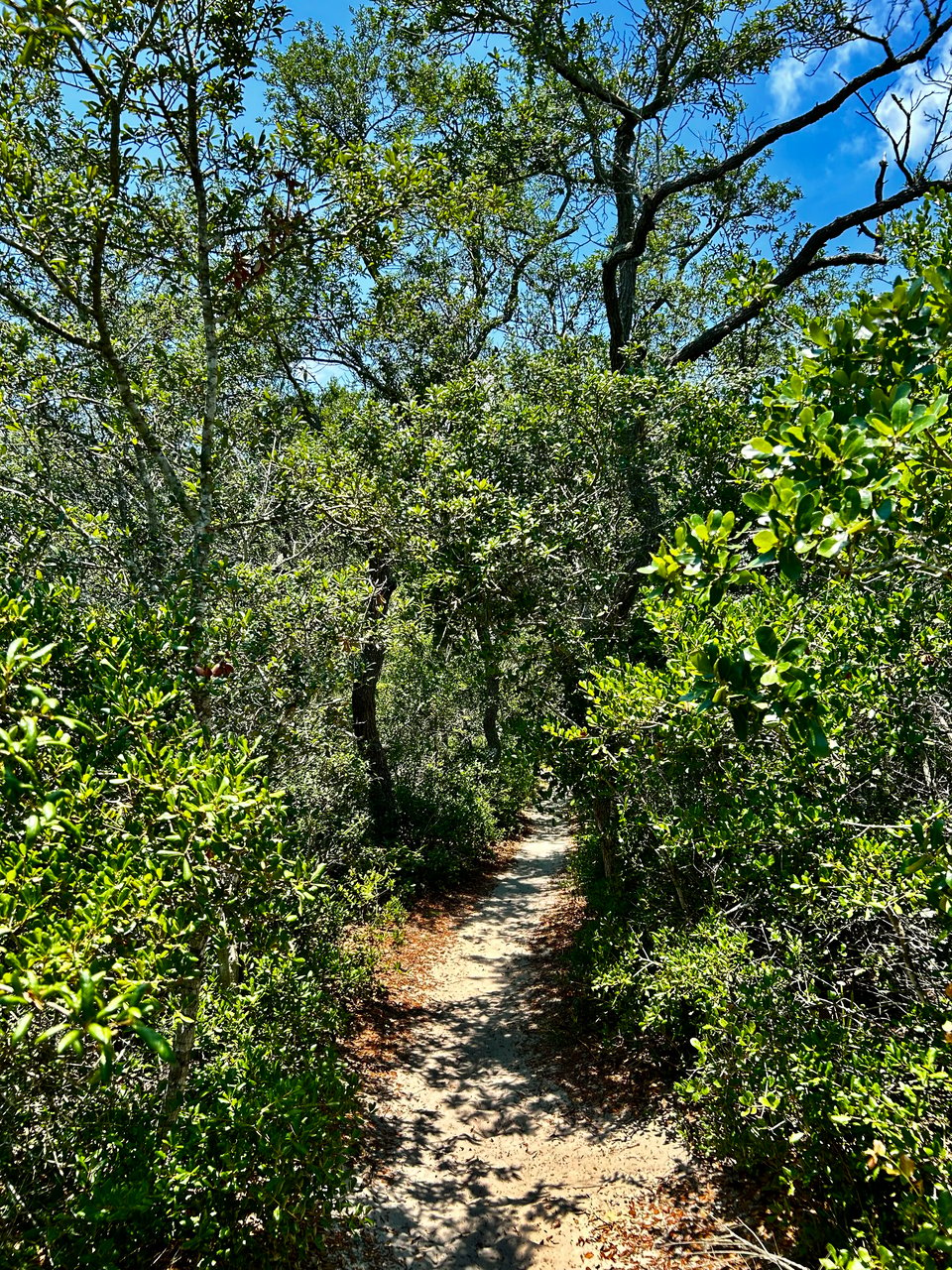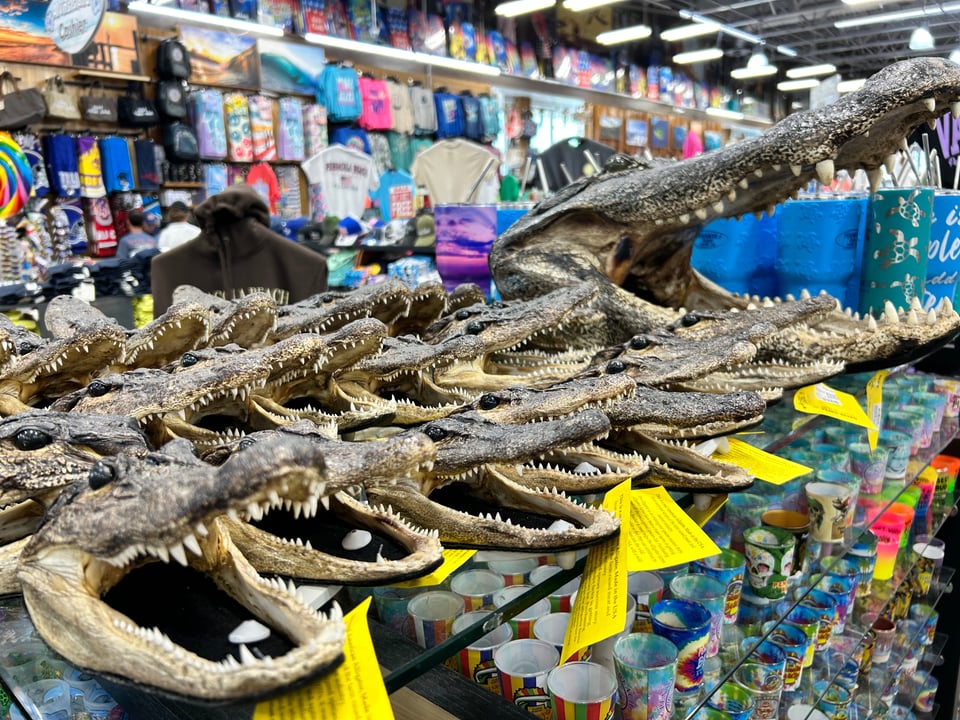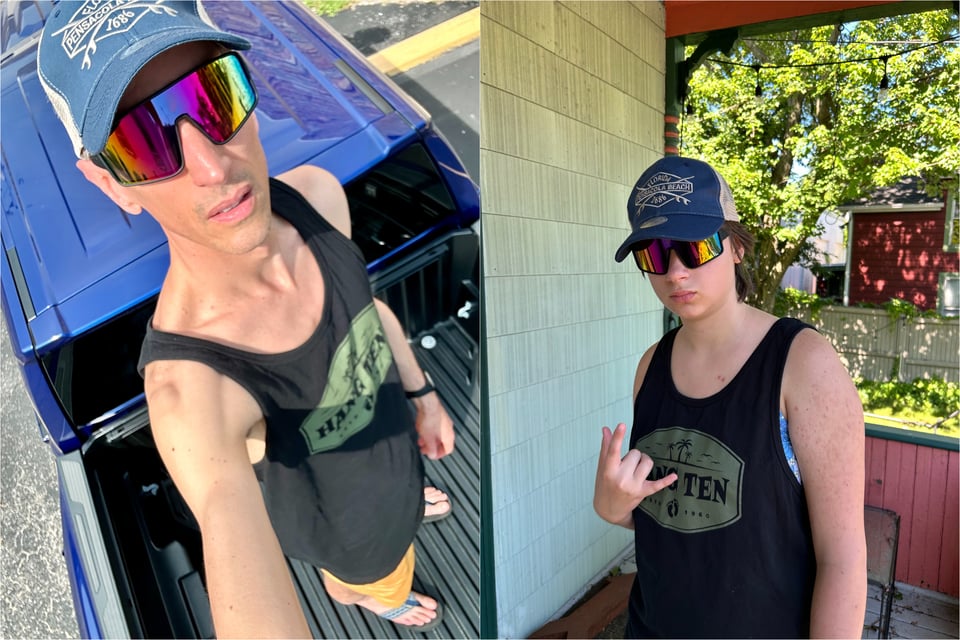This morning I left my bed, walked down to the kitchen, and brewed a pot of Blue Bottle coffee. The beans were a Father’s Day gift from my sixteen-year-old child. It was a beautiful morning—breezy, sunny, and dry, likely the last such day before a punishing heat wave sets in—and I sat on my porch, solving my array of daily puzzles, thinking about the two men I designate “father,” though only one gets the casual honorific “Dad.” That is my adoptive father. I saw him last week. It was the first time since my wedding a year and a half ago, which ended in a glimpse of him with his arm around my birth mother’s brother’s shoulder: a moment of two timelines meeting in violation of taboo, the social contract, the spirit of the law, and all that is holy.
On the second Sunday in June I was in a plane landing at the Destin-Fort Walton Beach Airport in northwest Florida. I grew up in Fort Walton Beach. Dad moved Mom and me there when I wasn’t quite nine years old. It’s where I grew up; it’s where Mom died, while I was off at college; it’s where Dad remarried and then, two years ago, became a widower again. That’s when his mind began fading. His sisters live in Birmingham, Alabama, where I was born and adopted. They are his caretakers now. They moved him to an assisted-living community after he was discharged from the hospital for treatment for gastric bleeding. He has been there for a little over a month. “I think now is a good time to come see him,” one of his sisters told me.
I left the plane; I fetched my tiny carryon I was required to check; I walked to the rental-car counter. I had requested a compact car, and they gave me a Toyota pickup truck. The weather was beautiful: hot, but fanned by an ocean breeze. I drove over the Mid-Bay Bridge and to a Publix supermarket in Destin. I grabbed a deli sandwich and some snacks. I drove to Henderson Beach State Park on the Gulf of Mexico and joined the long line of cars, crawling smoothly. I entered the bath house, changed into my bathing suit, trudged through the sand to the beach-rental booth, and reserved two chairs and an umbrella. You can never predict how the water will be. Sometimes it will be choked with stinking sargassum. Sometimes a red tide will turn the ocean to poison. This day it was clear and bottle-glass green. It was bathtub warm—maybe worryingly warm, but I decided not to think about it. I waded out and floated under the sun, a speck beneath the bowl of a once again startlingly huge sky. For about three hours I alternated between basking and reading. I had brought fellow adoptee Sandra Steingraber’s memoir, Living Downstream. I was alone, plunging into the comforting atavism of reenacting my early years in Florida when I would spend whole days on the beach by myself, hunting for sand dollars or coquinas or augers or blue crabs, or pretending I was storming Omaha Beach, or teaching myself how to skimboard. Meanwhile, my dad was in his room about ten miles west, wrapped in a tangle of blankets, with a box of uneaten lunch at his bedside. To use a word Sandra suggested to describe my state of mind, I was deep in dissociation.
I drove the ten miles west and checked into my hotel. Across the street was a pizza restaurant. I gobbled a small pie—I struggle with pacing when I eat—and drove to Dad’s facility. His sister had told me there was no need to knock, so I rapped gently on the door and, without waiting for a reply, stepped inside. He was wrapped up in bed, pale, gray, shrunken. His thin, fine hair was straggled and his face stubbled. I called to him, and he let out a cry of joy and pulled himself out of bed. We talked for about two hours. He proudly showed me his framed photograph collages, depicting everyone in his family, from his father posing in his Merchant Marine uniform for a portrait in 1943 to my own children when they were in preschool. I promised to send him updated photos. In fact, I said, I might buy him a digital picture frame to connect to the community wi-fi, so that he can have a revolving slideshow—the same slideshow that my birth mother enjoys in her apartment in upstate New York.
I asked him how the food was. It was very good. In fact, he said, look at this spicy chicken sandwich with coleslaw and chips—and he passed me a styrofoam box, contents entirely untouched. I’d heard he wasn’t eating. Why? Grief, ennui, or dementia? Conversation revealed his thorough confusion about his circumstances. He didn’t know how long he had been in the place, but he told me more than once that it was only a kind of halfway house; he and the other residents were being “prepared to go back home.” But his townhouse, which he hadn’t allowed anyone to see until he was in the hospital and needed help with his dog, had already been cleaned out. My aunt had been shocked at the squalor that greeted her when she walked inside. She terminated his lease and hired a company to haul everything out, saving only some clothes and a few decorations. Dad’s landlord, a fellow parishioner at his church, had complained about damage to the wood-laminate flooring. So my aunt had hired a contractor to repair the damage.
After I said goodnight to Dad, I climbed into my truck and drove one mile north to the cemetery where both Mom and my stepmother are buried. I had no trouble finding Mom’s grave. It had been eleven years since I was last there. I had intended to read a short piece that I had composed in response to a call from an online magazine for submissions for “Letters to Adoption.” At the airport earlier that day, I’d read a terse email thanking me for my submission, which regrettably was not a good fit. I had addressed the piece to Mom, ostensibly to catch her up on all that had changed in my life since my last visit, a few weeks after which I had applied for a set of copies of my original birth records. But in fact it was an outpouring, in 740 words, of grief and anger over her unquenchable need for me, which had resulted not only in the total suppression of any mention of overcoming the silence and mystery of my adoption, but in a death of despair over the collapse of her marriage and my departure into adulthood. I didn’t read the piece. Seated cross-legged in front of the flat stone lodged level with the grass, I tried to extemporize. But I realized I did not know what to say, and anyway, lacking Shakespeare’s eloquence, I felt like a fool delivering a soliloquy to bones.
Dusk deepening to dark, I returned to the truck and spent over an hour driving in crisscrossing lines all over my hometown. I drove by my high school. I drove by the house I had shared with Mom, and by the houses of friends. I drove by the Catholic church and elementary school I attended. I drove by the old minigolf course, still busy despite rumors that it was up for sale. I was surprised, and a bit contemptuous, at how little changed the town looked, despite three decades’ passing.
I spent most of the next day alone. I drove west to Pensacola Beach and, yet once more, wandered the grounds of Fort Pickens. I hiked in the heat along the sandy paths of the Naval Live Oaks Nature Preserve, the first federal tree farm in the United States, designated by John Quincy Adams to supply sturdy timber for Navy warships. (The USS Constitution, moored not far from where I live, has North Florida oak beams in its hull.) I bought silly souvenirs for my two children and my stepson: personalized surfboard name tags with names somewhat similar to theirs, none of which are common enough to show up on tourist souvenirs. Later my older child was to tell me that this was “the funniest bit I think you’ve ever done.”

I returned to Dad’s room that evening, when his sister and her husband had come to town. The four of us met there and we talked Dad into walking to the dining room. He played the “Hail fellow, well met,” ambling among the tables and greeting the residents. Some tried to tempt him into getting a plate of food, but he insisted that he wasn’t hungry. One of them, upon Dad introducing me, looked at me, then Dad, then said, “Damn, you sure he’s yours?” I realized that I had nurtured a fantasy: that I would be returning to this town like the mythical hero, changed by his trials and by the fulfillment of his quest. That I would bring my new self, integrated into a fuller whole through recovering my preadoptive history. But as this stranger reenacted the old script—you don’t pass, boy; something just doesn’t make sense here—I saw that there is no way to bring the world, certainly not this part of it, into alignment with my new idea of myself. This place is closed to me. I don’t belong here.
Again and again I felt twinges of guilt for not spending more time with Dad, for not reaching out to the facility management for more information about his care, for not pressing his sister harder about helping with the legal and financial arrangements, for not offering to survey the contents of the three, or more, self-storage units he had scattered all over town. Instead, I was splitting my consciousness. I wanted to be present for him, if only for brief stretches. Otherwise, I sought to separate myself from everything about the place that summoned the ghosts of my history I had vainly imagined conquered. I went into the water. I went into the woods. I went into the places I could love unreservedly because they were unmarked by “the trail of the family serpent,” to mangle a phrase of William James.

The next day I again delayed my return to Dad’s room. I spent the morning in a small public park at the edge of the bay, reading Sandra’s book on a bench under an especially handsome live oak tree. I drove out for lunch with one of my high school teachers. We hadn’t been together face to face for over thirty years, but we had kept in touch online, and she knew the outlines of the story of my reunion, and she knew my reason for being in town. She understood my ambivalence. When she retired from teaching she left town for another one fifteen miles west. She told me that when she drives past our high school today, she can feel her stomach tighten. She told me about some of my classmates whom she especially disliked. We were superseding old social hierarchies. I loved connecting with someone from my past in a way that liberated us both.
I met Dad and my aunt and uncle later that afternoon. We made a plan to take him to dinner at an old, familiar Irish pub. When we left him, he was curling up in his blankets for a nap. When we returned a few hours later to fetch him, he was still asleep, and when we awakened him he said he’d changed his mind; he wasn’t hungry and didn’t want to get up. My uncle proposed a change: the three of us would go to one of his favorite places, an upscale white-tablecloth Cajun restaurant. It was thronged with tourists in sundresses and sandals and polo shirts and pleated chinos and deck shoes. We discussed comfortable topics, mainly ones of interest to him: photography, travel, music. Group dissociation.
I flew home the next morning. Soon, I assume, I’ll go back. I ask myself what the goal of the trip was, and whether I met it. I suppose I proved that I was willing to be present. This feels like a small achievement. Don’t families show up for each other? I think about Mom’s grave. Around one corner, I’d also seen my stepmother’s stone. It was a double; Dad’s name was already engraved there. Have I been present for any of them? Mom died when I was about to turn 21. I let others take charge. I remember her parents, in their late 70s, pulling up to the house in a pickup and walking to the front door, aiming to cart off furniture they believed was theirs. I remember Dad there, angrily demanding they leave. I remember Grandpa walking back to the truck and returning with a pistol wobbling in his hand. Then, I could excuse myself with the plea that I was caught in forces beyond my control.
When my stepmother died, I wrote an obituary and a eulogy and I sent them to Dad. I didn’t attend the funeral. I had a good excuse: I was recovering from COVID. Those acts at a distance thawed a long freeze, which had deepened years earlier when I had spoken with him about finding my birth mother and, in the course of the conversation, had referred to her as “my mother,” prompting him to say that he never thought he would hear me refer to anyone other than Mom by that word. We began to speak daily on the phone. A little over a year later, his arm was around my biological uncle’s shoulder. I thought I’d glimpsed a path toward reintegration.
That was a fantasy. I’m changed, but I don’t see how to bring my past into the future. I feel a responsibility to this old man, but I’m at a loss to describe its basis. He looks to be on the brink of death, and I don’t know what to do, or how to feel, about it. “You’re his son”—I’m not sure I know what that means, or that I ever did. I’m another man’s son—too? —instead? I keep myself at arm’s length from that other man, at least in part because his family wants no contact.
I like to say that adopted people are free to decide whom to call family—that no one can decide that for us, no matter what the legal record dictates. But does this freedom go beyond the linguistic? Can I freely decide to be bound or unbound by familial obligation when I am at such a momentous juncture in this family’s history? I’m not anesthetized: my heart broke to see Dad in his wasted and confused state. Do other sons feel the need to give back to their fathers—to sacrifice for them when they are in need? I am re-experiencing the dissociation I felt when my adoptive mother died. That happened two decades before I began thinking and writing critically about adoption. Is it a character flaw, or is it (also? instead?) a flaw in the idea that adoption welds families together?

The coffee was a wonderful gift. That kid knows my heart. I gave them my Dissociation Costume: the cheap tank top, trucker hat, and wraparound glasses I picked up in Florida as proper attire for driving an electric-blue pickup around a beachfront town. They wore the costume to Walden Pond today. It’s like we’re joined at the root of some sturdy tree.
